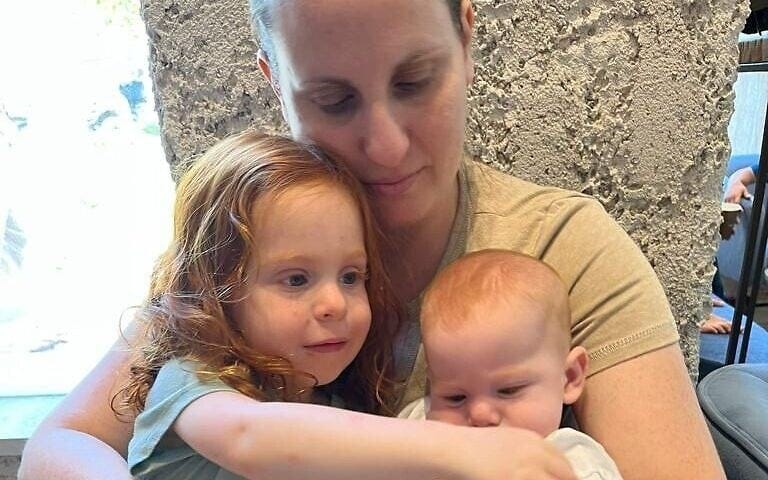Dearest Shiri:
Dear Shiri, my song—your name’s very meaning:
You have lived in my heart for so many months, in the hearts of so many. You are the face—one of the faces—of the tragedy of October 7th and of the tragedy of each and every one of the nearly 500 days that have followed.
Your face, anguished—the face of a mother being taken, abducted alongside her two children, one just three years old, the other only months, cradled in your arms. How strong and steadfast your arms were, holding them close, shielding them from the horror. Your face, as you watched your husband taken too. Your stifled screams, which have become the screams of so many.
Your face—a mother’s face—so Jewish, and at the same time, so much like the faces of other mothers who see their children besieged by evil and have no way to protect them.
Dear Shiri, my song,
For weeks, I have longed to write to you. Not because you will read this. Not because it will make the slightest difference in this tragedy. I write to you for all of us who saw you and dreamt of you. For all of us who longed for you without ever knowing you. For all of us who waited for your return home.
I write for who you are, for what you have endured, and for the pain of the countless mothers you represent.
I hesitated to write because I did not know how to begin. Sometimes, I started my words believing you were alive. Sometimes, fearing you were not. "Do not write until you know," I told myself. "It would be unethical, disrespectful."
But as the days passed, the shadows deepened. Hope dimmed. Expecting the worst yet desperately juggling thoughts to avoid confirming it. "So many days have passed, but they could have survived..." "They are valuable hostages; they will be protected..." A battle of the mind—between the grim possibilities of reality and the desperate prayer for a miracle.
Today, that fragile balancing act is no longer possible. Now we know.
The horror is not less horrific for having been anticipated.
The fury for what they did to you is not less fierce. Because what I feel now is fury. Blind. Raw.
Dear Shiri, my song,
The song that became a wrenching scream. Your children, who became the children of us all.
Those radiant little ones, with hair like fire, with their smiles, their pacifiers, their dancing—captured in photo after photo, video after video. A childhood stolen, ripped away. And the image of your arms, still holding them.
As the latest hostages were released (I refuse to call it an "exchange"—I find no equivalence between you, your children, and the monsters set free), we knew. If they did not release you first—women and children before all else—then things did not bode well.
And so began the cruel arithmetic of false consolation: Maybe one of them survived.
Hope that at least some would return, and terror at the endless combinations of who might have lived and who might not.
The mother without her children.
The children without their mother.
The father, alone.
The father and one child.
The parents without their children.
The children without their parents.
A thousand versions of hell.
Today, the counting stops. The miracles we prayed for do not come. We know the cruel truth:
Shiri Silverman-Bibas, 33, murdered.
Ariel Bibas, 5, murdered.
Kfir Bibas, 2, murdered.
And the terrible reality of Yarden, your husband—alive. If such devastation can be called life. A man alone, shattered, released after fifteen months in hell, only to return to another hell. A father without his children, yet forever their father. A husband without his wife, yet forever yours.
And I ask—I ask myself, I ask God—questions impossible to answer, useless to resolve:
What difference do the details make, when you are gone?
And yet, the questions haunt me. The images torment me.
How long did you survive? How many days, how many nights? Did you even know when night ended and day began, or was it all an endless purgatory?
Did they take you first, leaving your last breath filled with the agony of knowing your children were defenseless in hell?
Or did you see them die, powerless against the horror? Did you die together?
Did you sing them lullabies in captivity? How strong were your arms, shielding them from hate, from cold, from hunger? How did you explain this to Ariel? How did you hush Kfir’s cries?
Was there someone—anyone—who took pity? Who offered you a blanket, a morsel of kindness?
Dear Shiri, my song,
Today, you are light. Today, your children are the eternal fire that has lit the path of the Jewish people throughout history.
(And yet, saying this breaks me. Because we did not want you to be "light." No poetic platitudes. We wanted you to be alive—in flesh, in laughter, in ordinary, beautiful existence.)
Dear Shiri, my song:
Rest in peace. May your memory forever be a blessing—and a call to action—for the Jewish people and for all good people in this world.


